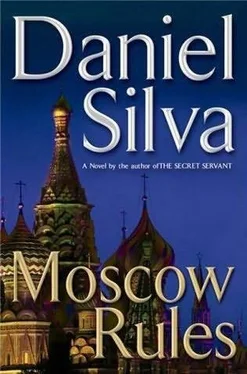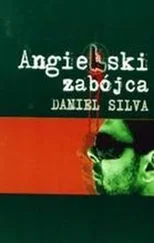They roared southward out of the city on a road that bore Lenin’s name and was lined with monuments to Lenin’s folly. Apartment blocks- endless apartments blocks. The biggest apartment blocks Gabriel had ever seen. It was as if the masters of the Communist Party, in their infinite wisdom, had decided to uproot the entire population of the world’s biggest country and resettle it here, along a few wretched miles of the Leninsky Prospekt. And to think that by the end of September it would be covered beneath a blanket of snow and ice.
At that hour, the Leninsky was two different roads: inbound lanes clogged with Muscovites returning from the weekend at their dachas, outbound lanes filled with giant trucks thundering out of the capital toward the distant corners of the empire. The trucks were both his allies and enemies. One moment, they granted Gabriel a place to hide. The next, they obscured his view. Shmuel Peled had been right about the Volga-it did run decently for a twenty-year-old piece of Soviet-made junk-but it was no match for the finest automobile Bavaria had to offer. The Volga topped out at about eighty-five, and did so with much protest and pulling to the left. Its little wipers were altogether useless against the heavy rain and road spray, and the defroster fan was little more than a warm exhalation of breath against the glass. In order to see, Gabriel had to lower both front windows to create a cross draft. Each passing truck hurled water against the left side of his face.
The rain tapered, and a few rays of weak sunlight peered through a slit in the clouds near the horizon. Gabriel kept his foot pressed to the floor and his eyes fastened to the taillights of the Mercedes. His thoughts, however, were focused on the scene he had just witnessed at the House on the Embankment. How had he managed it? How had Arkady convinced her to walk into the car without a fight? Was it with a threat or a promise? With the truth or a lie, or some combination of both? And why were they now hurtling down the Leninsky Prospekt, into the yawning chasm of the Russian countryside?
Gabriel was pondering that final question when he felt the first impact on his rear bumper: a car, much bigger and faster than his own, headlights doused. He responded by pressing the accelerator to the floor but the Volga had nothing more to give. The car behind gave him one more tap, almost as a warning, then moved in swiftly for the kill.
What followed was the classic maneuver that every good traffic policeman knows. The aggressor initiates contact with the victim, right front bumper to left rear bumper. The aggressor then accelerates hard and the victim is sent spinning out of control. The impact of such a tactic is magnified substantially when there is a sharp imbalance in the weight and power of the two vehicles-for example, when one is an S-Class Mercedes-Benz and the other is a rattletrap old Volga already being pushed to the breaking point. How many times Gabriel’s car actually rotated, he would never know. He only knew that, when it was over, the car was resting on its side in a field of mud at the edge of a pine forest and he was bleeding heavily from the nose.
Two of Arkady Medvedev’s finest waded into the mud to retrieve him, though their motives were hardly altruistic. One was a skinheaded giant with a right hand like a sledgehammer. The hammer struck Gabrielonly once, for once was all that was necessary. He toppled backward, into the mud, and for an instant saw upside-down pine trees. Then the trees streaked skyward toward the clouds like missiles. And Gabriel blacked out.
At that same moment, El Al Flight 1612 was rapidly gaining altitude over the suburbs of Moscow and banking hard toward the south. Uzi Navot was seated next to the window in the final row of first class, hand wrapped around a glass of whiskey, eyes scanning the vast carpet of winking yellow lights beneath him. For a few seconds, he could see it all clearly: the ring roads around the Kremlin, the snakelike course of the river, the thunderous prospekts leading like spokes into the endless expanse of the Russian interior. Then the plane knifed into the clouds and the lights of Moscow vanished. Navot pulled down his window shade and lifted the whiskey to his lips. I should have broken his arm, he thought. I should have broken the little bastard’s arm.
Gabriel opened his eyes slowly. Not eyes, he thought. Eye. The left eye only. The right eye was unresponsive. The right eye was the one that had been punched by the bald giant. It was now swollen shut and crusted over with clotted blood.
Before attempting movement, he took careful stock of his situation. He was sprawled on the concrete floor of what appeared to be a warehouse, with his hands cuffed at his back and his legs in something resembling a running position, right leg lifted in front of him, left extended backward. His right shoulder was pressing painfully against the floor, as was the right side of his face. Somewhere, a light was burning, but his own corner of the building was in semidarkness. A few feet away stood a stack of large wooden crates with Cyrillic markings on the sides. Gabriel struggled to make out the words but could not. The alphabet was still like hieroglyphics to him; the crates could have been filled with tins of caviar or vials of deadly polonium and he would have never known the difference.
He rolled onto his back and lifted his knees to his chest, then levered himself into a sitting position. The exertion of the movement, combined with the fact that he was now upright, caused his right eye to begin throbbing with catastrophic pain. He reckoned the blow had fractured the orbit around the eye. For all he knew, he no longer had an eye, just an immense crater in the side of his head where once his eye had been.
He leaned against the wooden crates and looked around him. There were other stacks of crates, towering stacks of crates, receding into the distance like the apartment buildings of the Leninsky Prospekt. From his limited vantage point, Gabriel could only see two rows, but he had the impression there were many more. He doubted they were filled with caviar. Not even the gluttonous Ivan Kharkov could devour that much caviar.
He heard the sound of footsteps approaching from a distance. Two sets. Both heavy. Both male. One man significantly larger than the other. The big man was the bald giant who had hit him. The smaller man was several years older, with a fringe of iron-gray hair and a skull that looked as if it been specially designed to withstand much blunt trauma.
“Where are the children?” asked Arkady Medvedev.
“What children?” replied Gabriel.
Medvedev nodded to the giant, then stepped away as if he didn’t want his clothing to be spattered with the blood. The sledgehammer crashed into Gabriel’s skull a second time. Same eye, same result. Pine trees and missiles. Then nothing at all.
63 LUBYANKA SQUARE, MOSCOW
Like almost everyone else in Moscow, Colonel Grigori Bulganov of the FSB was divorced. His marriage, like Russia itself, had been characterized by wild lurches from one extreme to the other: glasnost one day, Great Terror the next. Thankfully, it had been short and had produced no offspring. Irina had won the apartment and the Volkswagen; Grigori Bulganov, his freedom. Not that he had managed to do much with it: a torrid office romance or two, the occasional afternoon in the bed of his neighbor, a mother of three who was divorced herself.
For the most part, Grigori Bulganov worked. He worked early in the morning. He worked late into the evening. He worked Saturdays. He worked Sundays. And sometimes, like now, he could even be found at his desk late on a Sunday night. His brief was counterespionage. More to the point, it was Bulganov’s job to neutralize attempts by foreign intelligence services to spy on the Russian government and State-owned Russian enterprises. His assignment had been made more difficult by the activities of the FSB’s sister service, the SVR. Espionage by the SVR had reached levels not seen since the height of the Cold War, which had prompted Russia ’s adversaries to respond in kind. Grigori Bulganov could hardly blame them. The new Russian president was fond of rattling his saber, and foreign leaders needed to know whether it had an edge to it or had turned to rust in its scabbard.
Читать дальше












